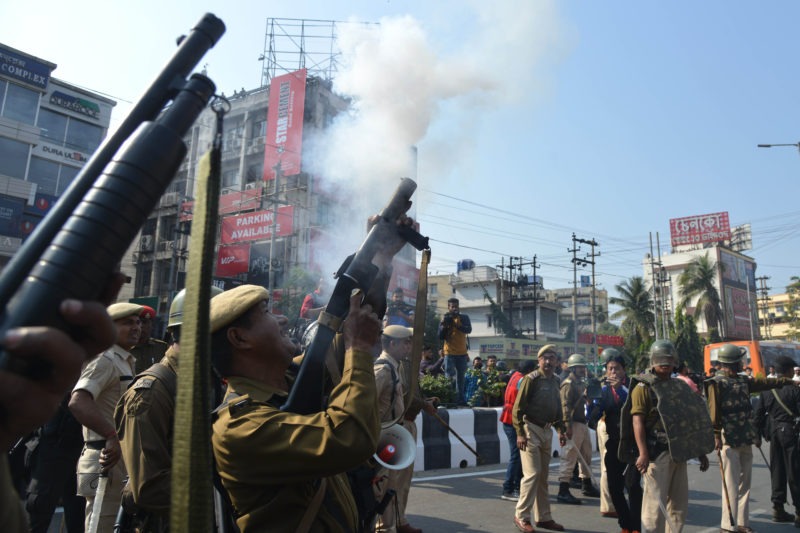Army deployed as contentious Indian citizenship bill debated
Police fired tear gas in India’s Assam state as thousands demonstrated against a contentious new citizenship bill (Biju BORO)
Guwahati (India) (AFP) – Indian authorities in the far-flung northeast called in troops Wednesday to help contain demonstrators opposed to contentious citizenship legislation expected to be approved by the upper house, officials said.
Troops were deployed to the state of Tripura and were on standby in Assam, a senior army official said, as police battled protesters railing against a bill that will fast-track citizenship claims for immigrants from three neighbouring countries — but not if they are Muslim.
For Islamic groups, the opposition, rights groups and others this is part of Prime Minister Narendra Modi’s Hindu-nationalist agenda to marginalise India’s 200 million Muslims — something he denies.
But many in India’s northeast, which on Wednesday was rocked by a third straight day of demonstrations following a general strike on Tuesday, oppose the new law for different reasons.
They object because the Citizenship Amendment Bill (CAB) stands to give citizenship to large numbers of Hindus who have emigrated from Bangladesh in recent decades.
Police fired tear gas in different parts of Guwahati, Assam state’s biggest city, as several thousand demonstrators attempted to barge past security barriers to converge on the adjoining state capital Dispur.
Tripura has suspended mobile internet services to stop the spread of misinformation on social media, according to authorities there.
“If the CAB is passed in Rajya Sabha (the upper house) today, we appeal to all the students, civilians, tea garden workers and all sections of the society to come out to the streets again tomorrow to protest,” local activist Akhil Gogoi said.
– ‘Eerie similarity’ to Nazi laws –
The legislation — which Modi’s government tried and failed to get through the upper house in its first term — passed the lower house just after midnight on Tuesday following a fiery debate.
Derek O’Brien, an opposition lawmaker in the upper house, on Wednesday said the legislation bore an “eerie similarity” to Nazi laws against in the Jews in 1930s Germany.
“In 1935 there were citizenship laws to protect people with German blood… today we have a faulty bill that wants to define who true Indian citizens are,” he said.
Modi’s government — re-elected in May and under pressure over a slowing economy — says Muslims from Afghanistan, Bangladesh and Pakistan are excluded from the legislation because they do not face discrimination in those countries.
Also left out are other minorities fleeing political or religious persecution elsewhere in the region such as Tamils from Sri Lanka, Rohingya from Myanmar and Tibetans from China.
Many Muslims in India say they have been made to feel like second-class citizens since Modi stormed to power in 2014.
Several cities perceived to have Islamic-sounding names have been renamed, while some school textbooks have been altered to downplay Muslims’ contributions to India.
In August, Modi’s administration rescinded the partial autonomy of Jammu and Kashmir, India’s only Muslim-majority state, and split it into two.
A citizens’ register in Assam finalised this year left 1.9 million people, many of them Muslims, facing possible statelessness, detention camps and even deportation.
Modi’s government has said it intends to replicate the register nationwide with the aim of removing all “infiltrators” by 2024.
Amit Shah, Modi’s right-hand-man and home minister, has likened illegal immigrants to “termites”.
“The Indian government is creating legal grounds to strip millions of Muslims of the fundamental right of equal access to citizenship,” Human Rights Watch said Wednesday.
The US Commission on International Religious Freedom on Monday termed the bill as a “dangerous turn in the wrong direction”.
India’s foreign ministry retorted that the remarks were “neither accurate nor warranted” and “guided by their prejudices and biases”.
Disclaimer: Validity of the above story is for 7 Days from original date of publishing. Source: AFP.


